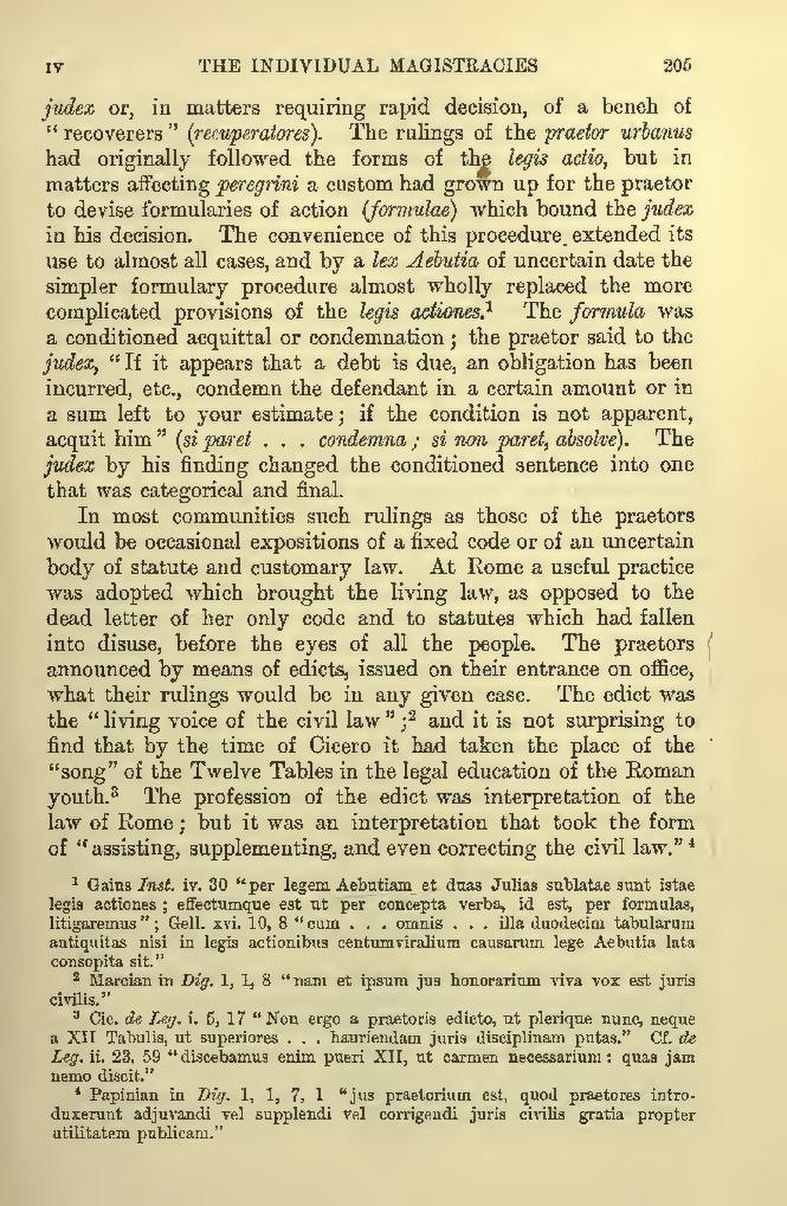judex or, in matters requiring rapid decision, of a bench of "recoverers" (recuperatores). The rulings of the praetor urbanus had originally followed the forms of the legis actio, but in matters affecting peregrini a custom had grown up for the praetor to devise formularies of action (formulae) which bound the judex in his decision. The convenience of this procedure extended its use to almost all cases, and by a lex Aebutia of uncertain date the simpler formulary procedure almost wholly replaced the more complicated provisions of the legis actiones.[1] The formula was a conditioned acquittal or condemnation; the praetor said to the judex, "If it appears that a debt is due, an obligation has been incurred, etc., condemn the defendant in a certain amount or in a sum left to your estimate; if the condition is not apparent, acquit him" (si paret . . . condemna; si non paret, absolve). The judex by his finding changed the conditioned sentence into one that was categorical and final.
In most communities such rulings as those of the praetors would be occasional expositions of a fixed code or of an uncertain body of statute and customary law. At Rome a useful practice was adopted which brought the living law, as opposed to the dead letter of her only code and to statutes which had fallen into disuse, before the eyes of all the people. The praetors announced by means of edicts, issued on their entrance on office, what their rulings would be in any given case. The edict was the "living voice of the civil law";[2] and it is not surprising to find that by the time of Cicero it had taken the place of the "song" of the Twelve Tables in the legal education of the Roman youth.[3] The profession of the edict was interpretation of the law of Rome; but it was an interpretation that took the form of "assisting, supplementing, and even correcting the civil law."[4]
- ↑ Gaius Inst. iv. 30 "per legem Aebutiam et duas Julias sublatae sunt istae legis actiones; effectumque est ut per concepta verba, id est, per formulas, litigaremus"; Gell. xvi. 10, 8 "cum . . . omnis . . . illa duodecim tabularum antiquitas nisi in legis actionibus centumviralium causarum lege Aebutia lata consopita sit."
- ↑ Marcian in Dig. 1, 1, 8 "nam et ipsum jus honorarium viva vox est juris civilis."
- ↑ Cic. de Leg. i. 5, 17 "Non ergo a praetoris edicto, ut plerique nunc, neque a XII Tabulis, ut superiores . . . hauriendam juris disciplinam putas." Cf. de Leg. ii. 23, 59 "discebamus enim pueri XII, ut carmen necessarium: quas jam nemo discit."
- ↑ Papinian in Dig. 1, 1, 7, 1 "jus praetorium est, quod praetores introduxerunt adjuvandi vel supplendi vel corrigendi juris civilis gratia propter utilitatem publicam."
